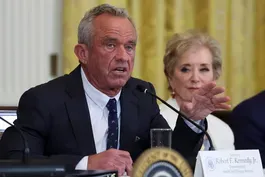
'The Afterlife of Malcolm X' examines his lasting impact
Clip: 5/27/2025 | 6m 47sVideo has Closed Captions
New book 'The Afterlife of Malcolm X' examines his lasting impact on civil rights
It’s been 100 years since Malcolm X was born in Omaha, Nebraska, and 60 years since he was assassinated. His expansive legacy is the focus of a new book written by journalist Mark Whitaker. He sat down with Amna Nawaz to discuss "The Afterlife of Malcolm X: An Outcast Turned Icon's Enduring Impact on America."
Problems with Closed Captions? Closed Captioning Feedback
Problems with Closed Captions? Closed Captioning Feedback
Major corporate funding for the PBS News Hour is provided by BDO, BNSF, Consumer Cellular, American Cruise Lines, and Raymond James. Funding for the PBS NewsHour Weekend is provided by...

'The Afterlife of Malcolm X' examines his lasting impact
Clip: 5/27/2025 | 6m 47sVideo has Closed Captions
It’s been 100 years since Malcolm X was born in Omaha, Nebraska, and 60 years since he was assassinated. His expansive legacy is the focus of a new book written by journalist Mark Whitaker. He sat down with Amna Nawaz to discuss "The Afterlife of Malcolm X: An Outcast Turned Icon's Enduring Impact on America."
Problems with Closed Captions? Closed Captioning Feedback
How to Watch PBS News Hour
PBS News Hour is available to stream on pbs.org and the free PBS App, available on iPhone, Apple TV, Android TV, Android smartphones, Amazon Fire TV, Amazon Fire Tablet, Roku, Samsung Smart TV, and Vizio.
Providing Support for PBS.org
Learn Moreabout PBS online sponsorshipAMNA NAWAZ: It's been 100 years since Malcolm Little, who went on to become civil rights activist Malcolm X, was born in Omaha, Nebraska.
It's also been 60 years since he was assassinated at just 39 years old.
His expansive legacy is the focus of a new book written by journalist Mark Whitaker.
And I spoke with him recently about "The Afterlife of Malcolm X: An Outcast Turned Icon's Enduring Impact on America."
Mark Whitaker, welcome back to the "News Hour."
Thanks for being here.
MARK WHITAKER, Author, "The Afterlife of Malcolm X: An Outcast Turned Icon's Enduring Impact on America": Thanks for having me.
AMNA NAWAZ: So this is a book about Malcolm X, but it really begins with his death.
You lay out in your own words how the impact on the 60 years since his assassination, as you say, arguably far surpassed what he was able to achieve in less than 40 years of life, which is a really interesting lens.
How did you arrive at that?
MARK WHITAKER: Well I have written about the Black power movement and its origins in 1966 from my last book.
And the interesting thing is that, even in 1966, he had been dead for a year, and yet he loomed over that year... AMNA NAWAZ: Yes.
MARK WHITAKER: ... over Black power, the Black arts movement, athletes like Muhammad Ali, Kareem Abdul-Jabbar, and of course, the autobiography, which is how most Americans first encounter Malcolm to this day, one of the great books of the last half-century, which only came out nine months after he was assassinated... AMNA NAWAZ: Yes.
MARK WHITAKER: ... and then came out in paperback a year later, when it really became a bestseller.
AMNA NAWAZ: You talk about the autobiography and the pivotal role it played in sort of calcifying his place in the American narrative, also the story about ghostwriter Alex Haley at the time, later of "Roots" fame, but of course, he was a young journalist who befriended him and gained his trust.
Why was the autobiography so pivotal for his story?
MARK WHITAKER: Because he told his personal story, right?
So, even if you don't believe his politics or you don't know that much about what he stood for, just his remarkable evolution, losing his parents at a young age, leaving school, becoming a street hustler, going to prison, then embracing the Nation of Islam, becoming this very controversial figure, but then, in the last year of his life, leaving the Nation of Islam, changing a lot of his views about white people and separatism and so forth, traveling the world, reaching out, becoming more of sort of a global figure.
When you think about it, there aren't a lot of men of his historical stature where you get that intimate portrait of them that you do in that book.
AMNA NAWAZ: The reach that he had after his passing in terms of who his message resonated with, you have laid this out so well about how someone like Malcolm was able to appeal both to Stokely Carmichael, right, the Black power firebrand, but also conservatives... MARK WHITAKER: Yes.
AMNA NAWAZ: ... like Supreme Court Justice Clarence Thomas.
MARK WHITAKER: Right.
AMNA NAWAZ: How does that work?
MARK WHITAKER: Well, I think it's partly because, before you get to his politics, which did evolve and were complicated, what Malcolm stood for was pride, self-belief, dignity, and embracing Black culture and Black history and so forth.
Now, today, we think that's commonplace, but that was actually in its own way sort of a revolutionary message in his day.
And I think that part of his message has, over the decades, appealed to people of very different political views.
AMNA NAWAZ: You mentioned his impact on athletes, and there's a moment forever seared in global memory at the 1968 Summer Olympics in Mexico City.
John Carlos and Tommie Smith stand on the metal podium and raise their fists in the air.
MARK WHITAKER: Yes.
AMNA NAWAZ: What's the connection to Malcolm X?
How did that happen?
MARK WHITAKER: Well, there are two connections.
First of all, Harry Edwards, who was a Black sociologist who organized that protest, was a follower of Malcolm's and had met him and viewed him as an inspiration.
But also John Carlos, who was one of those sprinters who raised his fist, had grown up in Harlem and as a teenager would follow Malcolm around like a puppy... ...like an eager puppy, just to absorb his message and to learn from him.
AMNA NAWAZ: Yes.
MARK WHITAKER: And so that got carried on.
And, later, there was a lot of controversy over that.
AMNA NAWAZ: Yes.
MARK WHITAKER: They got kicked out of Mexico City.
They suffered professional consequences and so forth.
But John Carlos wrote his own autobiography where he said he didn't regret any of that and that he felt prouder of taking those political stands than anything else he had done as an athlete, and that it was Malcolm who had inspired him to do that.
AMNA NAWAZ: There's also this idea of Malcolm as like pop culture muse decades after his passing.
You talk about his impact on music, on hip-hop.
It's the film a lot of people will remember... Spike Lee's film, "Malcolm X," played by Denzel Washington in there, which suddenly sparked a whole new awareness of his life.
Did that surprise you as someone who read his autobiography as a teen to see that kind of resurgence?
MARK WHITAKER: Well, I actually wrote a -- I worked for many years at "Newsweek" magazine, and I wrote a cover story when that film came out in 1992.
And that was a generation that was rediscovering Malcolm, right?
His memory had started to fade a little bit in the '70s and early '80s.
And then the early pioneers of hip-hop groups like Public Enemy, KRS-One, Tupac Shakur on their own sort of embraced him as a hero.
And then, of course, the movies came along and, of course, all the hats, the X hats that we all remember.
So one of the things that's really interesting about this book is, generation after generation, without there being a national holiday named after him, still young people relate to him over and over again in different phases of that period.
AMNA NAWAZ: So Malcolm X would be 100 if he'd lived and survived to today.
As you were writing this book, do you think about that, about what he would have thought about this time we're living in now?
MARK WHITAKER: So I don't think he would have -- we're living -- in our history of race in this country, we have periods of progress and then we have periods of backlash.
I think we could all agree that we're living in a period of backlash right now.
That would not have surprised him.
But what I think about a lot is, there's a lot of discussion these days about communication in politics and in activism and what kind of communication is effective and the need for people who can be authentic and can talk directly and so forth, talk with humor, talk to people of all backgrounds.
That was Malcolm while he was alive, but it's still why people relate to him.
You can go on YouTube to this day and listen to his speeches, and it feels like he's still talking directly to you.
AMNA NAWAZ: The book is "The Afterlife of Malcolm X."
The author is Mark Whitaker.
Mark, thank you so much.
Such a pleasure.
MARK WHITAKER: Always a pleasure.
Thank you so much.
Calls grow for judges to control their security force
Video has Closed Captions
Clip: 5/27/2025 | 6m 45s | As Trump lashes out against courts, calls grow for judges to control their security force (6m 45s)
A look at Trump's controversial pardons for loyalists
Video has Closed Captions
Clip: 5/27/2025 | 7m 16s | A look at Trump's controversial pardons for political allies and loyalists (7m 16s)
News Wrap: CDC changes COVID shot recommendations
Video has Closed Captions
Clip: 5/27/2025 | 4m 56s | News Wrap: CDC no longer recommends COVID shots for healthy children and pregnant women (4m 56s)
NPR CEO on suing Trump over order targeting funding
Video has Closed Captions
Clip: 5/27/2025 | 7m 3s | NPR CEO discusses suing Trump administration over order targeting funding (7m 3s)
University of the People offers affordable college education
Video has Closed Captions
Clip: 5/27/2025 | 8m 58s | University of the People offers students a new and affordable college experience (8m 58s)
U.S.-backed Gaza aid system quickly overwhelmed
Video has Closed Captions
Clip: 5/27/2025 | 10m 25s | New U.S.-backed aid distribution system in Gaza quickly overwhelmed (10m 25s)
Providing Support for PBS.org
Learn Moreabout PBS online sponsorshipSupport for PBS provided by:
Major corporate funding for the PBS News Hour is provided by BDO, BNSF, Consumer Cellular, American Cruise Lines, and Raymond James. Funding for the PBS NewsHour Weekend is provided by...

















